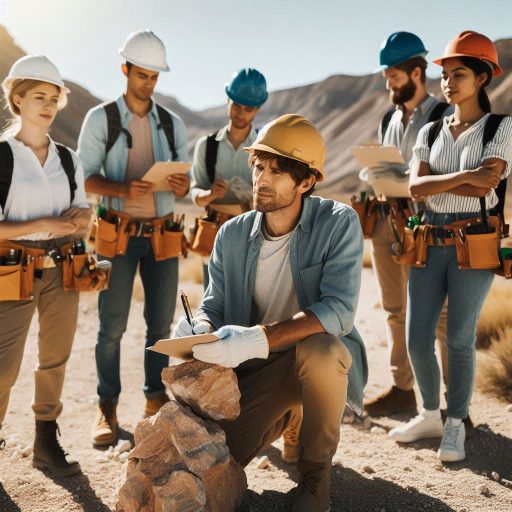Introduction
Geology is the study of Earth‘s materials, processes, and history.
It encompasses various sub-disciplines, including mineralogy, paleontology, and environmental geology.
This diverse field offers numerous career opportunities in industries like energy, mining, and environmental consulting.
Landing your first job as a geologist is crucial for career development.
It allows you to apply theoretical knowledge in real-world scenarios.
A first job helps you build essential skills, gain industry experience, and establish professional connections.
These factors are vital for advancing in your geology career.
Aspiring geologists should employ effective strategies to secure their first position.
First, focus on gaining relevant experience through internships or volunteer opportunities.
This hands-on experience makes your resume stand out.
Networking is equally important; attend industry conferences and engage with professionals in the field.
Consider joining geology-related organizations to expand your connections and access job listings.
Tailor your resume and cover letter to highlight relevant skills and experiences.
Additionally, develop strong communication and teamwork skills, as these are essential in the workplace.
Landing your first geology job requires dedication and strategic planning.
By leveraging experiences and networking, aspiring geologists can successfully enter this rewarding field.
Research and Understand the Geology Industry
Overview of Different Sectors Within the Geology Industry
The geology industry encompasses various sectors, each offering unique career opportunities.
These sectors include environmental consulting, mineral exploration, petroleum geology, and government agencies.
Environmental consulting firms assess and mitigate environmental impacts caused by human activities.
They often hire geologists to evaluate soil, water, and air quality.
Mineral exploration companies focus on discovering and developing mineral resources.
Geologists in this sector conduct surveys and analyze geological data to locate valuable minerals.
Petroleum geology involves exploring oil and gas reserves.
Geologists work to identify potential drilling sites and assess extraction methods.
Government agencies, such as the U.S. Geological Survey, provide valuable information about natural resources and hazards.
Geologists in these organizations conduct research, gather data, and inform public policy.
Additionally, academia offers opportunities for geologists to teach and conduct research at universities.
Importance of Understanding Industry Trends and Demands
Understanding industry trends is crucial for aspiring geologists.
The geology job market fluctuates based on economic conditions and technological advancements.
For instance, a growing emphasis on renewable energy has increased demand for geologists specializing in sustainable practices.
Familiarity with industry trends helps you identify promising job sectors.
Keeping up with trends also allows you to tailor your skills and knowledge.
Geologists proficient in Geographic Information Systems (GIS) or remote sensing are increasingly sought after.
These technologies enhance data collection and analysis, making geologists more competitive in the job market.
Moreover, understanding industry demands helps you anticipate job opportunities.
Networking with professionals and joining industry organizations can provide insights into current and future trends.
This knowledge can guide your education and career choices, making you a more attractive candidate.
Resources for Researching Geology Job Openings and Companies
Several resources are available to help you research geology job openings and companies.
Start by visiting job boards specializing in geology and earth sciences.
Websites like Earthworks, Geology.com, and the American Geosciences Institute (AGI) offer job listings tailored to geologists.
These platforms often list positions in various sectors, making it easier to find suitable opportunities.
LinkedIn is another valuable resource for job seekers.
Create a professional profile highlighting your skills and education.
Connect with professionals in the geology field and follow companies of interest.
LinkedIn also features job listings, allowing you to apply directly through the platform.
Networking is essential for discovering job opportunities.
Attend geology conferences, workshops, and seminars to meet professionals in the industry.
These events provide opportunities to learn about job openings and establish valuable connections.
Additionally, joining professional organizations can offer access to exclusive job boards and networking events.
University career services are also beneficial for research.
Many universities maintain job boards and offer career counseling for geology students.
Utilize these resources to explore internships, entry-level positions, and potential employers.
Landing your first job as a geologist requires understanding the industry and its trends.
By exploring different sectors, staying informed about demands, and utilizing available resources, you can position yourself for success.
Proactively researching job openings and networking within the geology community will significantly enhance your job search efforts.
Read: Essential Skills and Tools for Modern Chemists in America
Develop Relevant Skills and Qualifications
Necessary Education and Degrees for Geology Jobs
To land your first job as a geologist, you typically need a relevant degree.
Most entry-level positions require at least a bachelor’s degree in geology or earth sciences.
Some employers may prefer candidates with a master’s degree, especially for advanced roles.
A bachelor‘s degree provides essential knowledge in areas like mineralogy, petrology, and sedimentology.
Coursework often includes classes in chemistry, physics, and mathematics, which are critical for understanding geological processes.
Participating in fieldwork during your studies enhances your practical skills and knowledge.
Internships are valuable for gaining real-world experience while completing your degree.
Many universities offer internship programs that connect students with industry professionals.
Completing an internship not only bolsters your resume but also helps you build a professional network.
Consider pursuing advanced degrees if you want to specialize further or conduct research.
Graduate programs often focus on specific fields such as environmental geology, hydrogeology, or geophysics.
A master’s or Ph.D. can open doors to higher-paying positions and research opportunities.
Certifications and Licenses That May Be Required
In addition to a degree, obtaining relevant certifications can enhance your job prospects.
Many employers prefer candidates with a Professional Geologist (PG) license, especially in certain states.
The PG license demonstrates expertise and commitment to the profession.
To earn a PG license, you typically need to pass an exam and gain a certain amount of work experience.
Each state has its own requirements, so it‘s important to research the specifics for your location.
Some states also require continuing education to maintain your license.
Other certifications may focus on specialized areas, such as hydrogeology or environmental assessment.
These credentials can make you a more attractive candidate, as they demonstrate specialized knowledge.
Joining professional organizations, such as the American Institute of Professional Geologists (AIPG), can also provide networking opportunities and resources.
Additional Skills: Fieldwork Experience, Data Analysis, and Software Proficiency
In addition to education and certifications, specific skills are crucial for securing your first geology job.
Fieldwork experience is highly valuable, as it helps you apply classroom knowledge to real-world situations.
Many employers look for candidates who have participated in field studies or internships.
Data analysis skills are essential for interpreting geological data and making informed decisions.
Familiarity with statistical analysis and data visualization tools can give you a competitive edge.
Employers often seek candidates who can analyze geological data and present findings clearly.
Proficiency in geology-related software is another important skill.
Many companies use software for mapping, modeling, and analyzing geological data.
Familiarize yourself with programs like ArcGIS, RockWorks, or MATLAB to enhance your job prospects.
Finally, strong communication skills are essential for presenting research findings and collaborating with team members.
Being able to convey complex ideas clearly will help you stand out in job interviews.
Landing your first job as a geologist requires a combination of education, certifications, and practical skills.
By focusing on these areas, you can increase your chances of success in the competitive job market.
Emphasizing your field experience, data analysis abilities, and software proficiency will further enhance your appeal to potential employers.
Read: Top Chemistry Departments and Schools in the US
Network with Professionals in the Field
Importance of Building Connections in the Geology Industry
Building connections in the geology industry is essential for several reasons.
First, personal relationships can lead to job referrals.
Many companies prefer hiring candidates recommended by trusted employees.
Networking helps you meet professionals who can vouch for your skills and work ethic.
Second, connections provide access to industry information.
Engaging with experienced geologists allows you to learn about job openings and trends.
They can share insights into different career paths, helping you make informed decisions.
This knowledge can guide you toward areas of geology that align with your interests.
Lastly, networking fosters mentorship opportunities.
Finding a mentor in the geology field can significantly impact your career.
A mentor can offer advice, share experiences, and help you navigate challenges.
They can also connect you with other professionals in the industry.
Attending Conferences, Seminars, and Workshops
Attending conferences, seminars, and workshops is an effective way to network in the geology field.
These events bring together professionals, researchers, and students.
Participating allows you to meet people who share your interests and goals.
Conferences often feature keynote speakers, panel discussions, and networking sessions.
Engaging with speakers and attendees can lead to meaningful connections.
Be proactive in introducing yourself and discussing your aspirations.
Prepare your elevator pitch to succinctly communicate your background and interests.
Additionally, workshops provide hands-on learning opportunities.
They often cover specialized topics in geology, helping you gain new skills.
Meeting instructors and participants at these events can expand your network.
You never know when a connection made at a workshop might lead to a job opportunity.
Joining Professional Organizations and Online Forums
Joining professional organizations is another excellent way to build connections in the geology industry.
Organizations like the American Geophysical Union (AGU) and the Geological Society of America (GSA) offer resources and networking opportunities.
Membership often includes access to exclusive job boards, newsletters, and industry publications.
Participating in local chapters or events can enhance your networking efforts.
These gatherings allow you to meet professionals in your area and build relationships.
Additionally, volunteering for committees or events can showcase your commitment and skills, further strengthening connections.
Online forums and social media platforms also play a vital role in networking.
Joining platforms like LinkedIn enables you to connect with industry professionals.
Participating in discussions, sharing insights, and asking questions can establish your presence in the geology community.
Online groups and forums often share job postings and valuable resources.
Building connections in the geology industry is crucial for landing your first job.
Attending conferences, seminars, and workshops helps expand your network.
Joining professional organizations and online forums further enhances your opportunities.
By actively engaging in the geology community, you increase your chances of finding job openings and receiving valuable guidance.
Networking is not just about making connections; it’s about fostering relationships that can support your career throughout your journey as a geologist.
Read: The Role of Chemists in US Environmental and Sustainability Efforts
Gain Practical Experience through Internships or Volunteer Opportunities
Benefits of Hands-On Experience in the Field
Gaining hands-on experience is essential for aspiring geologists.
Practical experience allows you to apply theoretical knowledge from your studies.
Working in the field helps you understand geological processes in real-world settings.
This experience can set you apart from other candidates when applying for jobs.
Fieldwork develops critical skills such as problem-solving and teamwork.
You will learn to work with diverse teams, enhancing your communication skills.
Additionally, you will become familiar with various geological tools and equipment.
Mastering these skills can increase your confidence in job interviews.
Moreover, field experience exposes you to different geological environments.
You will observe rock formations, soil types, and hydrology firsthand.
This exposure broadens your understanding of geology and its applications.
Employers value candidates with practical knowledge and a strong fieldwork background.
Finding Internships or Volunteer Opportunities
Finding internships and volunteer opportunities can significantly boost your career prospects.
Start by researching local universities and geological organizations.
Many institutions offer internship programs for students seeking hands-on experience.
Online platforms like LinkedIn, Indeed, and Glassdoor can help you find relevant internships.
Use specific keywords like “geology internship” or “field research volunteer” to narrow your search.
Additionally, check your university‘s career services for job boards or networking events.
Networking is crucial when searching for internships.
Attend geology conferences, workshops, and seminars to meet professionals in the field.
Engaging with professors and classmates can also lead to valuable connections.
They may know of opportunities or recommend you for positions.
Consider reaching out directly to local geological firms, environmental agencies, or non-profits.
Express your interest in internships or volunteer positions.
Even if they don‘t have formal programs, they may welcome enthusiastic help on projects.
Making the Most of These Experiences
Once you secure an internship or volunteer position, make the most of it.
Approach every task with enthusiasm and a willingness to learn.
Show initiative by asking questions and seeking additional responsibilities.
Your eagerness will impress supervisors and colleagues.
Keep a detailed record of your tasks and achievements.
Document your contributions to projects, including specific skills and techniques you learned.
This information will help you articulate your experiences on your resume.
Building relationships with your colleagues is equally important.
Network with fellow interns and professionals you encounter.
These connections can lead to job referrals or recommendations in the future.
Seek feedback from supervisors to identify areas for improvement.
Constructive criticism can help you grow and develop your skills.
Actively incorporate their suggestions to enhance your performance during your internship.
Hands-on experience in the field is vital for aspiring geologists.
Finding internships and volunteer opportunities can boost your career prospects significantly.
By making the most of these experiences, you can build a strong resume and expand your professional network.
With dedication and enthusiasm, you will enhance your chances of landing your first job as a geologist.
Read: Biology Ethics: Navigating Complex Issues in the US

Tailor Your Resume and Cover Letter for Geology Jobs
Relevant Skills, Qualifications, and Experiences
Landing your first job as a geologist requires a strong foundation of skills and qualifications.
Employers seek candidates with relevant educational backgrounds, such as a degree in geology or earth sciences.
Courses in mineralogy, sedimentology, and geophysics provide essential knowledge for aspiring geologists.
In addition to formal education, practical experience is crucial.
Internships, fieldwork, and research projects demonstrate your commitment to the field.
Participate in geology clubs or volunteer for environmental organizations.
These experiences enhance your resume and help you develop valuable skills.
Employers also value technical skills in geological software and data analysis.
Familiarity with programs like ArcGIS and MATLAB sets you apart from other candidates.
Highlight these skills in your resume and during interviews.
Strong communication and teamwork abilities are equally important.
Geologists often collaborate with engineers and environmental scientists.
Showcasing your interpersonal skills can make a significant difference in your job search.
Customizing Application Materials
Customizing your application materials is essential for standing out.
Tailor your resume and cover letter for each job application.
Begin by analyzing the job description to identify key qualifications and skills.
Focus on matching your experiences with the specific requirements of the position.
In your resume, prioritize relevant coursework, internships, and projects.
Use bullet points to highlight accomplishments and responsibilities clearly.
Quantify your achievements whenever possible.
For example, mention the percentage of improvement in a research project or the number of field sites you surveyed.
Your cover letter should express genuine interest in the position and the company.
Mention specific projects or initiatives the company is involved in and how your background aligns with them.
This tailored approach shows employers that you took the time to understand their needs and are a suitable candidate.
Showcasing Your Passion for Geology
Showcasing your passion for geology can significantly enhance your application.
Include a summary statement at the beginning of your resume that highlights your enthusiasm for the field.
Use this section to briefly mention your career goals and interests.
Throughout your application materials, emphasize your experiences that demonstrate your passion.
Discuss any relevant projects, research, or volunteer work in detail.
If you attended geology conferences or participated in field studies, mention these experiences.
They illustrate your commitment and dedication to the discipline.
During interviews, share personal stories that reflect your love for geology.
Discuss what initially sparked your interest in the field and how it has evolved.
Passionate candidates often leave a lasting impression on employers.
They can convey a genuine desire to contribute to the field and the organization.
Landing your first job as a geologist requires a strategic approach.
Focus on relevant skills, qualifications, and experiences to enhance your application.
Customize your resume and cover letter for each position to demonstrate your suitability.
Finally, showcase your passion for geology in all application materials.
This approach will help you stand out in a competitive job market and increase your chances of success.
Transform Your Career Today
Unlock a personalized career strategy that drives real results. Get tailored advice and a roadmap designed just for you.
Start NowPrepare for Interviews and Presentations
Common Interview Questions for Geology Jobs
Landing your first job as a geologist requires preparation for common interview questions.
Employers often ask about your educational background and relevant experiences.
Be ready to discuss your geology coursework and any fieldwork you completed.
They might also inquire about your specific interests within geology.
Highlight any specializations, such as environmental geology or mineralogy.
Another common question focuses on your problem-solving skills.
Employers seek candidates who can analyze complex data and develop solutions.
Prepare examples from your academic or project work to illustrate your analytical abilities.
Additionally, interviewers may ask about teamwork experiences.
Geology often involves collaboration, so share instances where you worked effectively with others.
Employers might also inquire about your familiarity with industry-standard software and tools.
Discuss any experience you have with GIS, modeling software, or data analysis tools.
Being knowledgeable about these technologies shows your readiness for the job.
Lastly, prepare for questions about your career goals.
Clearly articulate your aspirations and how they align with the company‘s mission.
Practicing for Technical Interview Questions
Technical interview questions assess your knowledge and problem-solving abilities in geology.
To prepare, review core concepts and current industry trends.
Brush up on essential topics such as rock types, geochemical processes, and geological mapping techniques.
Understanding these concepts allows you to answer questions confidently.
Mock interviews can help you practice technical questions.
Ask a mentor or peer to conduct a simulated interview.
Focus on articulating your thought process clearly while solving problems.
Use real-world examples from your studies or fieldwork to demonstrate your knowledge.
You can also utilize online resources for practice questions.
Websites, forums, and study groups can provide valuable insights into common technical queries.
The more you practice, the more comfortable you will become during the actual interview.
Presenting Your Research or Projects Effectively
During job interviews, effectively presenting your research or projects can set you apart.
Start by selecting relevant projects that highlight your skills and knowledge.
Choose projects that showcase your problem-solving abilities and technical expertise.
When discussing your research, use a clear and concise format.
Begin with a brief overview of the project‘s objectives.
Explain your methods and the results you achieved.
Focus on how your work contributes to the field of geology or addresses real-world problems.
Visual aids can enhance your presentation.
Use slides, charts, or diagrams to illustrate your findings.
Visuals help clarify complex concepts and engage your audience.
Ensure that your visuals are simple, informative, and easy to understand.
Finally, practice your presentation skills.
Rehearse your delivery with friends or family to gain feedback.
This practice will help you feel confident and polished during the interview.
Remember to be enthusiastic about your work; your passion for geology will resonate with potential employers.
Preparing for your first geology job interview involves understanding common questions, practicing technical skills, and effectively presenting your research.
With thorough preparation and a confident presentation, you will significantly increase your chances of landing the job.
Stay Updated on Industry News and Developments
Importance of Staying Current with Industry Trends
Staying informed about industry trends is crucial for new geologists.
The geology field evolves rapidly with advancements in technology and research.
Employers seek candidates who understand current developments.
Knowledge of emerging trends can set you apart from other applicants.
Familiarize yourself with issues like climate change, resource management, and sustainable practices.
Being knowledgeable about these topics demonstrates your commitment to the field.
Follow reputable sources to keep up with industry news.
Subscribe to newsletters or journals focused on geology.
Regularly reading articles will help you stay informed.
You can also follow relevant organizations and professional groups on social media.
Engaging with industry leaders and influencers on platforms like LinkedIn enhances your visibility.
Subscribing to Geology Publications and Blogs
Subscribing to geology publications and blogs can broaden your knowledge.
These resources often feature articles, research findings, and insights from experienced geologists.
Reading diverse perspectives helps you understand different aspects of geology.
Some well-known publications include the Journal of Geological Sciences and Geology Today.
Blogs can also be an excellent source of information.
Many professional geologists maintain blogs discussing their experiences and insights.
Follow these blogs to gain practical knowledge and advice.
You‘ll also find tips for job searching, networking, and career development.
Consider joining forums or online communities where geologists share experiences and resources.
Attending Conferences and Workshops to Expand Your Knowledge
Attending conferences and workshops is vital for professional growth.
These events provide opportunities to learn from industry experts.
Networking is another key benefit of attending conferences.
Meeting professionals can lead to valuable connections and job opportunities.
Look for upcoming geology conferences in your area or online.
Events like the Geological Society of America Annual Meeting are great places to start.
Workshops often focus on practical skills, such as field techniques and data analysis.
Participating in these sessions helps you build essential competencies.
Be prepared to engage actively during conferences.
Ask questions, participate in discussions, and exchange contact information with fellow attendees.
Follow up with new connections after the event to solidify relationships.
Networking is crucial in geology, as many jobs arise from personal recommendations.
Staying current with industry trends, subscribing to geology publications, and attending conferences are essential for aspiring geologists.
These strategies enhance your knowledge and expand your professional network.
Committing to lifelong learning can significantly improve your chances of landing your first job as a geologist.
Approach your career with enthusiasm and curiosity, and you will find opportunities to thrive in this dynamic field.
Delve into the Subject: What Does a Botanist Do? Exploring Daily Responsibilities
Conclusion
Landing your first job as a geologist requires strategic planning and determination.
Start by building a strong academic foundation through relevant coursework and field experience.
Internships provide invaluable hands-on skills and connections within the industry.
Network with professionals at geology conferences or local events to expand your opportunities.
Tailor your resume and cover letter to highlight your skills and experiences relevant to each job application.
Research potential employers and understand their specific needs.
This preparation will help you stand out among candidates.
Don‘t hesitate to seek mentorship from experienced geologists.
They can offer valuable advice and insights into the job market.
Stay persistent in your job search; rejection is part of the process.
Each application is an opportunity to refine your approach.
Remember, a career in geology is both rewarding and impactful.
Geologists contribute to environmental conservation, resource management, and understanding Earth‘s processes.
With determination and a proactive approach, you will find opportunities that align with your passion for geology.
Embrace the journey, and stay focused on your goals.
The right position will come along, paving the way for a fulfilling career in this essential field.




